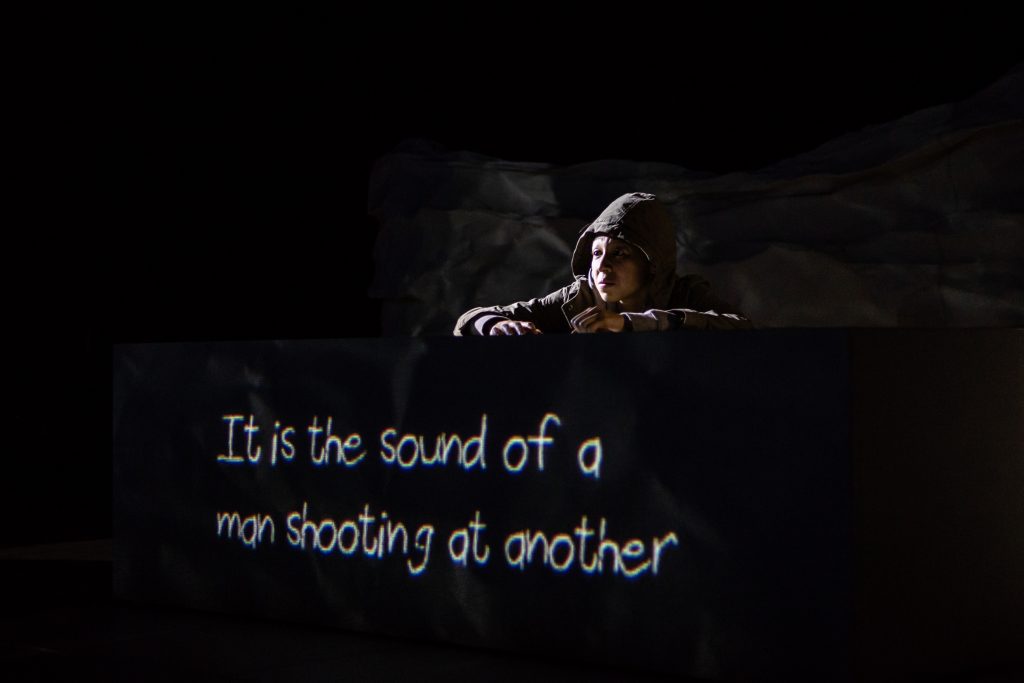Going Through @ The Bush Theatre Review & Interview with Translator Kirsten Hazel Smith
Due to current political affairs, Brexit encompasses the majority of television, social media and conversation. These discussions are had nationwide between family members, close friends and even strangers. Within these conversations, immigration is often thrown around as a pawn upon a bigger chess board, a throw away part of a larger playing field. Estelle Savasta’s Going Through (originally Traversée) delves into the arduous and lamentable trials of a young girl, having to embark on a journey of immigration that would be dangerous for any adult, let alone a child.

Ali Wright, Going Through, The Bush Theatre
Savasta’s French play has been translated to English by Kirsten Hazel Smith. However, the translation and accessibility does not end there. Sign language plays a crucial role in the production as Nadia Nadarajah plays a deaf adoptive mother, Youmna. Nadarajah’s sign language is verbally matched by Charmaine Wombwell’s, Nour, adoptive daughter of Youmna. They sync up in unison as they converse in two contrasting forms of communication. Wombell’s verbal translations address the audience directly, establishing a connection with the character as we travel along with her on her mountainous journey.
Rajha Shakiry’s set further aids the blend between the verbal and sign language. Clean white boards harbour Nina Dunn’s simple but effective projections contribute to establishing each section of the journey’s setting. The projections display subtitles during parts of the narrative, translating for those who cannot interpret sign language and delivering the odd piece of silent dialogue from an actorless character. The subtitles also place emphasis on certain moments, causing them to linger in the mind, welcoming speculation and heavy waves of pathos.
The cast of two are wonderful to watch, Wombwell’s Nour takes centre stage as the protagonist; she is brave, defiant yet understandably terrified all at once. She faces travelling with complete strangers, avoiding gunfire and having to hide her true gender with a half understanding of what happens to young girls in such a hostile environment. Nadarajah’s Youmna is also particularly compelling, without even having to understand sign language, one can understand her stoicism, humble nature, and deeply rooted love for Nour.
After seeing Going Through, the stories of immigrants that are so often used as political fodder are no longer just stories. Instead a fleshed out narrative of sacrifice, womanhood and identity encapsulates the Bush Theatre, which is portrayed in a manner that is accessible to not only the average theatre-goer, but also the deaf community too. 4/5
Review written by Daniel Elliman.
Going Through is currently showing until Saturday 27th April 2019 at the Bush Theatre. To find out more about the production, visit here…

Ahead of Going Through’s UK premiere at the Bush Theatre, the show’s translator, Kirsten Hazel Smith spoke to us about working on this pertinent piece.
Find a play that you love. It is so much easier to translate something that you are passionate about. I loved getting to work with Estelle, so much so that I am currently translating her latest project Lettres Jamais Ecrites, which will be presented as a reading at 4pm Thursday 26th April at the Bush Theatre.Questions by Lucy Basaba.


Leave a Comment